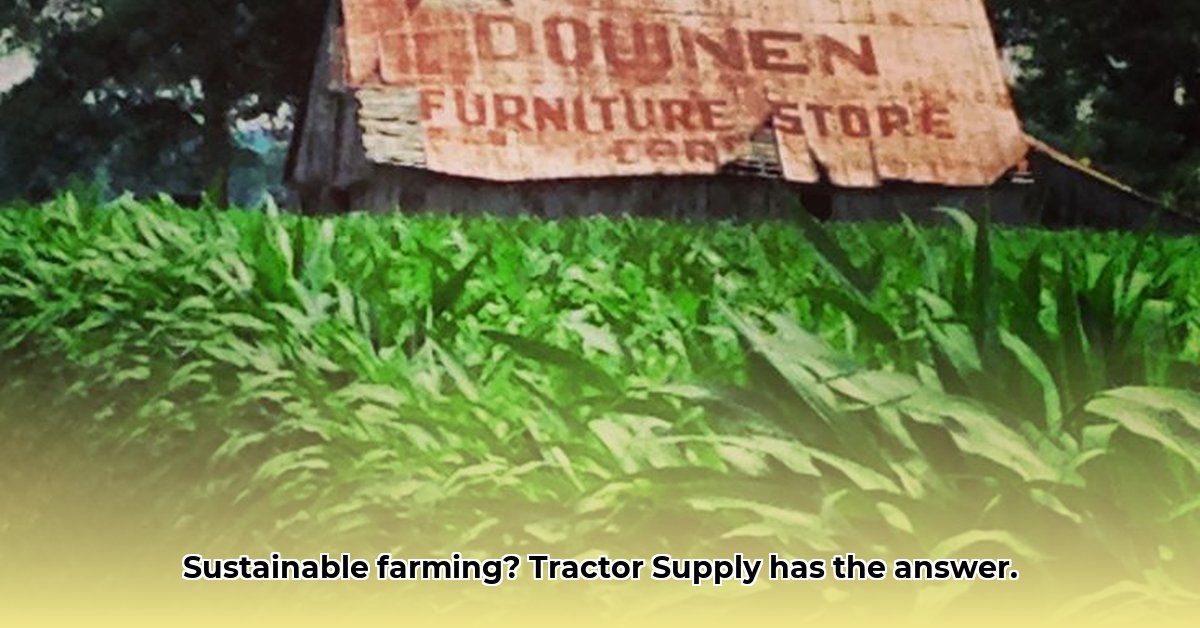
Tractor Supply Carmi, Illinois: A Critical Examination of Sustainability
Tractor Supply Company (TSC) in Carmi, Illinois, serves as a primary source of agricultural supplies for local farmers. This article analyzes TSC's role in supporting sustainable agricultural practices within the Carmi community, examining both its contributions and limitations. The analysis is based on publicly available information from TSC's website and general observations regarding the availability of sustainable products and the transparency of their supply chains. For comparison, see information on a similar store here.
Methods and Data Sources
This analysis primarily relies on publicly accessible information, including TSC's corporate website 1, which details some of their broader sustainability initiatives. However, specific data on the sustainable sourcing of products sold at the Carmi, Illinois location is limited. The evaluation incorporates general observations on product availability and labeling. A significant limitation of this study is the lack of readily available, detailed information on TSC’s Carmi store's specific product sourcing and environmental impact.
Findings
Accessibility of Supplies: A Convenient but Incomplete Picture
TSC's convenient location and wide selection of products offer considerable accessibility to farmers in Carmi. The ease of acquiring necessary supplies saves farmers valuable time and resources. This accessibility, however, doesn't guarantee that the supplies themselves are sustainably sourced or produced. While some organic seeds and potentially other sustainably produced goods may be available, the extent of this offering remains unclear without more detailed information from TSC.
Transparency Gap: Information Deficit Hinders Sustainable Choices
A critical weakness is the lack of transparency regarding the sourcing and environmental impact of TSC’s products. The website provides limited information on supply chain ethics and sustainability certifications. This opacity makes it difficult for farmers to make informed decisions aligned with sustainable farming goals. For example, without knowing the origin and transport methods of fertilizers, farmers cannot fully assess their environmental footprint. This lack of transparency presents a significant barrier to responsible purchasing decisions. How can farmers effectively prioritize sustainability if critical information is unavailable?
Uncertain Product Origins: Tracing the Supply Chain
Significant uncertainty surrounds the origins and production methods of many of TSC's products. Are the fertilizers produced using sustainable components? Are the construction materials sustainably harvested? The dearth of information means it's challenging to determine the overall environmental footprint of these products, extending beyond the product itself to include manufacturing, transportation, and packaging. The lack of detailed information hinders farmers' efforts to implement sustainable farming practices. This problem affects not only the product itself but the entire agricultural value chain.
Analysis and Interpretation
TSC's role in supporting sustainable agriculture in Carmi is complex. The convenience it offers is undeniable; however, its sustainability performance needs considerable improvement. The lack of detailed information on product sourcing and a lack of clarity regarding their efforts to address Scope 3 emissions represent significant opportunities for improvement. Without substantial changes in transparency and supply chain practices, TSC's contribution to a sustainable agricultural ecosystem in Carmi remains limited, despite any broader corporate sustainability initiatives reported elsewhere. Further research focusing on the sustainability practices at the local Carmi store level is needed.
Recommendations and Conclusion
Addressing the sustainable agriculture practices of TSC in Carmi requires a multi-faceted approach involving various stakeholders:
TSC: Should conduct a comprehensive sustainability audit of its Carmi store, making detailed product sourcing and environmental impact information readily available to consumers. Increased transparency through clear labeling and readily available information is crucial. Active partnerships with local organizations promoting sustainable agriculture should be explored.
Local Farmers: Should actively seek out and use more sustainable alternatives when available and demand greater transparency from TSC regarding product sourcing and sustainability certifications. Consider collective action to encourage change.
Local Government: Can incentivize sustainable agricultural practices through grants or by supporting initiatives that increase transparency and accountability within the agricultural supply chain.
Researchers/NGOs: Should conduct independent research into TSC’s localized impact on sustainable agriculture and publish their findings to inform both policymakers and consumers.
In conclusion, while TSC in Carmi provides essential supplies to local farmers, its current contribution to sustainable agriculture is hindered by a lack of transparency and readily available information about the sustainable nature of its products. Increased transparency, enhanced sustainability efforts, and collaborative action are essential for TSC to truly contribute positively to the future of sustainable agriculture within the Carmi community. Further investigation into the broader environmental impact of TSC's supply chain is needed.